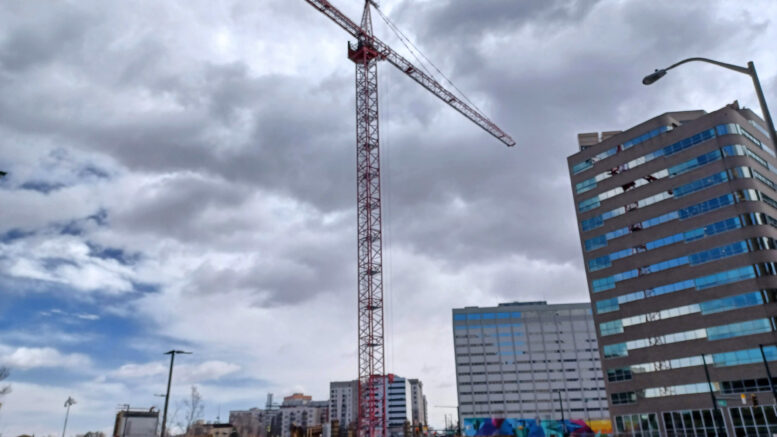Given the choice between very different approaches to addressing construction-defects law, Colorado legislators on Tuesday overwhelmingly backed a bill to make it harder for condo owners to sue builders and then killed a separate bill favored by trial lawyers.
The decisions — particularly to advance House Bill 1272 from the House Transportation, Housing and Local Government Committee by a 12-1 vote — make it very likely that the General Assembly will pass long-debated construction-defects reform this year. However, it remains to be seen whether changes made to the bill during a hearing are enough to convince skeptical builders and business groups that the proposal will do enough to bring down insurance costs and restart new condo construction.
Moderate Democratic Rep. Shannon Bird of Westminster, who changed her approach and joined with liberal Democratic Rep. Andy Boesenecker of Fort Collins this year after her previous effort died in 2024, said HB 1272 is about increasing home ownership. And to do that, the proposal takes two approaches — it tries to reduce the frequency and magnitude of lawsuits that have driven builders of affordable condos out of the market while offering new protections of quality to home purchasers.
Construction-defects bill gets amended
Facing concerns from attorneys and a homeowners’ coalition, the pair made several changes to HB 1272 during its first committee hearing Tuesday. They removed a provision applying its new protections only to middle-market condominiums and yanked a rebuttable presumption for builders that a home is defect-free if it receives a certificate of occupancy from a local government.
The heart of the bill now gives an affirmative defense to builders against legal action if they hire an independent third-party inspector during construction and offer a warranty of two years for plumbing and heating and six years of major structural components. It also requires homeowners whose builders agree to these conditions to accept repairs for alleged defects and limits legal action to “damage that affects the functionality of a system or the safety of real or personal property other than a condition that has not caused any substantial physical change.”

Colorado state Rep. Andy Boesenecker speaks to the Colorado Chamber of Commerce Health Policy Council in March 2023.
By barring suits over seemingly minor damages like a missing nail and by boosting the threshold for a condo owners’ association to file lawsuits to 65% of owners (versus a simple majority in current law), HB 1272 should deter many suits, proponents said. And all these new benefits are given to builders that voluntarily choose to participate in this incentive program by offering warranties and bringing on inspectors, meaning they are willing to prove quality to loosen legal shackles, backers said.
Why the bill is needed
The current system, Bird and others noted, has plummeted the share of new housing construction that is condos — typically a lower-cost option for entry into home ownership — from 20% of the market to 3% in the past 17 years. Colorado is now the eighth-most-expensive housing market in the country, and surveys found that while 90% of renters would like to own a home someday, only 53% think that is possible.
“We need a system where people can afford to buy a home. And if there’s a problem, they need a fair way to be made whole. And all of that needs to happen in a way that doesn’t crash our housing market,” Bird said. “Right now, our current system isn’t working because we’re not building things that people can afford to buy. So, the bill is an attempt to change that problem that we have, to change the system.”

Colorado state Rep. Shannon Bird cheers at the start of a news conference last month rolling out her construction-defects reform bill.
Trial attorneys and the Build Our Homes Right coalition led the opposition to HB 1272, saying that it strips homeowners of the right to go to court when builders cut corners and leave them unable to inhabit the biggest investment they will ever make. Construction-defects attorney Jennifer Seidman said the restrictions on filing lawsuits would mean that homeowners with faulty fire-safety systems must wait for a fire to erupt to sue builders, or that those with bricks falling off their house have no legal recourse.
Pushback from construction professionals
Home builders also offered resistance, saying that certain provisions in the bill would keep it from making the changes it sought to make, particularly in terms of bringing insurers back into the market. Scott Wilkinson, an attorney who represents construction professionals, said current insurance policies bar claim settlements like repairs without extensive investigations by insurers first, and the bill would open third-party inspectors to lawsuits unless they inspected every unit in a condominium complex, he warned.
Bird and Boesenecker attempted to address that with two changes via provisions in their amendment. One bars insurers from canceling policies if home builders agree to make repairs as a settlement offer, and the other states that inspectors only must investigate claimed defects rather than the entire property. Home builders did not say whether those changes would be enough to get them to back the bill.
But every committee member backed HB 1272 except for Rep. Steven Woodrow, D-Denver. Woodrow pushed Colorado Insurance Commissioner Michael Conway, a bill supporter, on his claim that HB 1272 would lower insurance premiums for builders and was miffed with Conway’s response that insurers had told him just that it will create more competition.
A conflicting bill dies in committee

Colorado state Rep. Steven Woodrow speaks at a 2024 news conference on transit-oriented development.
“Tort reform did not make medicine any cheaper in Colorado; it just made justice less attainable. I want a solution that we know we can say beyond anecdotally that this will help,” said Woodrow, a plaintiffs’ attorney. “So, what will this do to drive down premiums? I would love to hear from an actuary or insurance carrier. Respectfully, ‘more robust competition’ just isn’t a satisfying answer.”
The changes made to HB 1272 were enough, though, to get Rep. Jennifer Bacon to get the same committee to kill her HB 1261, which sought to boost homeowners’ protections and seemed to many observers to be a foil against construction-defects reform. The Denver Democrat had proposed in her measure to extend the statute of limitations on defects claims and to require that that courts award prejudgment interest of 8% to prevailing construction-defects claimants.
Bacon said sponsors of HB 1272 incorporated some of her ideas, such as requiring pretrial disclosures of specific contractors who’d worked on alleged defects, and they offset other worries by allowing successful defects claimants to recover attorneys’ fees. And while she asked them to consider extending the statute of limitations for filing defects claims — a request sponsors so far have denied — she said she felt the bill had come far enough where she would drop HB 1261.
Opponents still seeking fixes to HB 1272
However, members of the Build Our Homes Right coalition joined Bacon in calling for changes to that bill that would further strength homeowners’ protections, as HB 1261 had sought to do.
“Poor workmanship and substandard drainage led to several cracks in my foundation, ceiling, compromised door jambs and moulding popping out of place. Aside from a few superficial fixes, my builder refused to address the underlying problems and ran out the clock on having to do any other repairs,” said Janine Musser, a Westminster homeowner, in a statement. “Coloradans need protections from builders of shoddy homes, so it’s essential to strengthen warranty, third-party inspection and provisions that provide broad builder immunity from having to ensure quality construction or repairs on new homes.”
HB 1272 will head next to the House floor with enough support that its passage appears likely in that chamber. With Gov. Jared Polis having announced his support for the bill, that means it could face its biggest test in the Senate, despite its cosponsor in that chamber being Senate President James Coleman.
